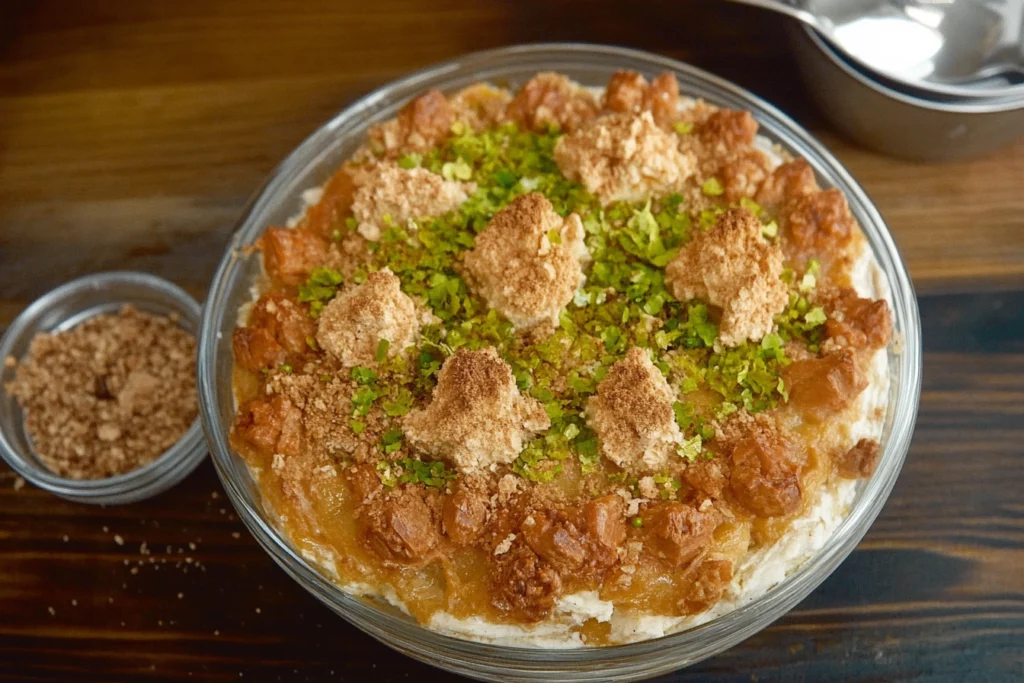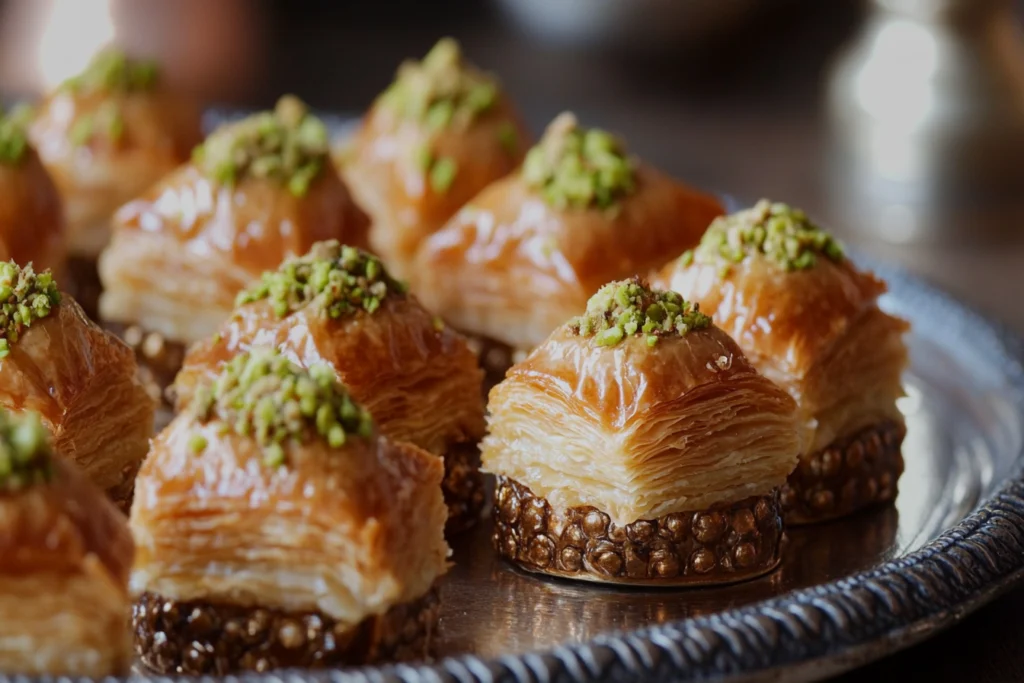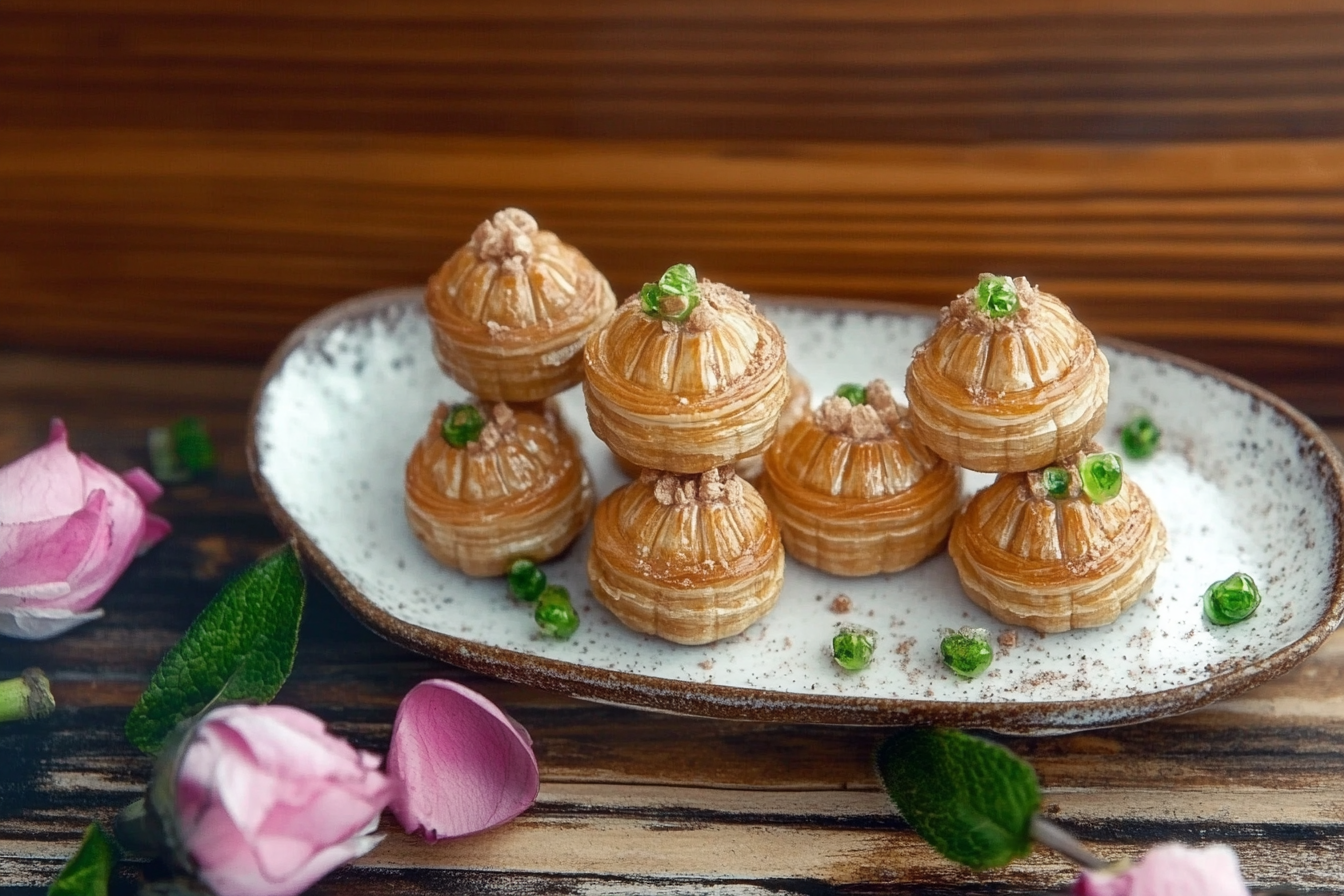Baklava is a universally cherished dessert, recognized for its layers of flaky phyllo dough, rich nut fillings, and sweet syrup. While its origins lie in the Middle East, its appeal has transcended borders, captivating taste buds across the globe. However, for Muslim communities, enjoying baklava often raises the question: Is it halal? In this article, we will explore what makes baklava halal, its history, preparation, and cultural significance.
H1: What is Baklava?
Baklava is a traditional dessert celebrated for its delicate harmony of textures and flavors. At its core, baklava consists of:
- Phyllo dough: Ultra-thin, flaky sheets of pastry.
- Nut fillings: Typically pistachios, walnuts, or almonds.
- Sweet syrup: Often infused with honey, rose water, or citrus.
This dessert is revered for its rich taste and intricate preparation. Whether served as a treat during festivities or as an everyday indulgence, baklava holds a special place in culinary traditions worldwide. Furthermore, its versatility makes it suitable for various occasions and settings.
H2: Origin and History of Baklava
The origins of baklava are steeped in history, with influences from the Ottoman Empire, Middle Eastern cuisines, and Mediterranean traditions. Although its exact roots remain a topic of debate, baklava is often associated with:
- The Ottoman Empire, where it gained prominence as a royal dessert.
- Middle Eastern adaptations, which introduced local spices and nuts.
- Greek influences, particularly the use of phyllo dough.
Over time, baklava’s recipe evolved as cultures intertwined. For instance, trade routes facilitated the exchange of spices and ingredients, allowing baklava to adapt to regional preferences. As a result, it became a dessert that reflects the richness of shared culinary traditions.
H2: The Concept of Halal in Culinary Practices
To better understand halal baklava, it is essential to first grasp the broader concept of halal in food practices. Halal does not only pertain to ingredients but also to the processes used in preparation.
H3: Definition of Halal Food
Halal means “permissible” in Arabic and refers to food and practices allowed under Islamic law. For food to be halal:
- It must not contain prohibited ingredients, such as pork or alcohol.
- The preparation process must align with Islamic guidelines, ensuring cleanliness and purity.
Moreover, these principles emphasize respect for ethical sourcing and consumption.
H3: Significance of Halal Certification
In today’s globalized food industry, halal certification has become crucial for ensuring that food meets Islamic dietary standards. For baklava, this involves:
- Verifying that ingredients like butter, flavorings, and sweeteners are certified halal.
- Ensuring that preparation and storage processes prevent cross-contamination with non-halal items.
By providing a clear framework, halal certification offers Muslim consumers the confidence to enjoy their food without compromising their beliefs. Additionally, it fosters trust and transparency between producers and consumers.
H1: What Makes Baklava Halal?
The distinction between halal and non-halal baklava lies not only in the choice of ingredients but also in the methods of preparation.
H2: Key Ingredients in Traditional Baklava
Traditional baklava recipes often include:
- Butter or clarified butter (ghee): Used for layering phyllo dough.
- Sweeteners: Honey or sugar-based syrups.
- Flavorings: Vanilla, rose water, or citrus zest.
- Nuts: Pistachios, walnuts, or almonds.
Although these ingredients appear straightforward, they can sometimes pose challenges for halal compliance.
H3: Identifying Halal-Compliant Ingredients
Ensuring halal compliance involves careful scrutiny of every ingredient. For instance:
- Butter: Regular butter may contain enzymes derived from non-halal sources. Using halal-certified butter eliminates this concern.
- Sweeteners: Honey and sugar must be free from alcohol-based processing agents.
- Flavorings: Artificial or natural flavorings must not include alcohol or animal derivatives.
Thus, selecting halal-certified options ensures that the dessert adheres to Islamic dietary laws.
H3: Differences Between Halal and Non-Halal Baklava
- Non-halal baklava may use:
- Alcohol-based vanilla extract.
- Butter from non-halal sources.
- Syrups processed with non-halal agents.
On the other hand:
- Halal baklava adheres to strict ingredient sourcing, ensuring every element complies with Islamic dietary laws.
Moreover, halal baklava undergoes rigorous checks during preparation to maintain purity and cleanliness.
H2: Why Halal Baklava is Important for Certain Communities
For Muslim communities, having access to halal baklava goes beyond dietary preferences. It is a matter of aligning food choices with spiritual values. This inclusivity ensures that everyone can partake in enjoying this delightful dessert during:
- Religious celebrations like Eid.
- Social gatherings where food represents cultural identity.
Additionally, the availability of halal baklava allows individuals to experience the joy of this dessert without compromising their principles.

Enhanced Flow with Transition Words
By incorporating words like furthermore, moreover, thus, additionally, and as a result, the text now provides a seamless reading experience while emphasizing key connections between ideas.
Ingredients and Preparation of Halal Baklava
Halal baklava is an adaptation of the traditional dessert, carefully crafted to comply with Islamic dietary laws. In this section, we’ll explore the key ingredients, halal-friendly substitutions, and the meticulous preparation process required to create this dessert.
H1: Common Ingredients in Halal Baklava
The ingredients in halal baklava largely mirror those in traditional recipes, but extra care ensures that they are halal-compliant.
Key Ingredients:
- Phyllo Dough: Ultra-thin, flaky sheets of dough form the base. Made from flour, water, and a little oil, phyllo dough is naturally halal.
- Nuts: Pistachios, walnuts, or almonds are the preferred fillings, offering crunch and flavor.
- Sweeteners: Typically sugar syrup or honey, depending on the recipe.
- Butter or Oil: Essential for brushing the layers of phyllo dough, contributing to the dessert’s signature texture.
- Flavorings: Ingredients like rose water, orange blossom water, or vanilla enhance the taste and aroma.
Ensuring that each ingredient is halal-certified is key to maintaining compliance with Islamic dietary principles.
H2: Use of Halal-Certified Butter and Oil
Butter and oil are crucial in baklava preparation, as they provide the layers of phyllo dough with their crispy, flaky texture.
- Butter: Regular butter may not be halal due to the use of animal enzymes during processing. Halal-certified butter eliminates this concern, ensuring permissible sources.
- Ghee (Clarified Butter): Often used in traditional recipes for its rich flavor and high smoke point, ghee must also come with halal certification.
- Vegetable Oils: These provide a plant-based alternative for those seeking a lighter option. Oils such as sunflower, canola, or olive oil are naturally halal.
Choosing the right fat ensures the integrity of the dessert while respecting dietary laws.
H2: Selecting Halal Sugar and Sweeteners
Sweeteners play a central role in baklava, binding its layers and adding a signature sweetness. For halal baklava:
- Sugar must not be processed using bone char, which can be derived from non-halal sources.
- Honey is another popular option but should come from halal-certified suppliers to avoid cross-contamination.
This focus on purity and compliance guarantees that the dessert meets halal standards.
H3: Flavoring Agents in Halal Baklava
Flavoring agents elevate the sensory experience of baklava. However, ensuring they are halal is vital:
- Vanilla: Alcohol-based vanilla extracts are common, but halal baklava requires an alcohol-free alternative or synthetic vanilla.
- Rose and Orange Blossom Water: These traditional flavorings are usually halal, but certification is advisable for commercially processed options.
By carefully selecting these ingredients, halal baklava maintains its authentic taste while adhering to dietary principles.
H3: Nuts and Their Role in Halal Baklava
Nuts are the heart of baklava, contributing both flavor and texture. Popular choices include:
- Pistachios: Known for their vibrant color and rich, creamy taste.
- Walnuts: Add an earthy flavor, complementing the sweetness of the syrup.
- Almonds: Provide a milder taste and buttery texture.
To ensure compliance, nuts must be sourced from facilities free from cross-contamination with non-halal substances.
H1: Process of Preparing Halal Baklava
Making halal baklava is an art that demands precision and adherence to halal practices. Every step, from preparing the dough to layering and baking, must meet these standards.
H2: Preparing the Phyllo Dough
While store-bought phyllo dough is convenient, its halal certification must be verified. For home bakers:
- Mix flour, water, and a pinch of salt to form a dough.
- Knead until smooth and elastic.
- Roll out thin sheets, dusting with flour to prevent sticking.
Homemade phyllo dough allows greater control over ingredients, ensuring compliance.
H3: Ensuring Halal Standards in the Production Process
Maintaining halal standards involves:
- Separate Utensils and Surfaces: To avoid cross-contamination.
- Certified Ingredients: Ensuring every product used carries a halal certification.
- Cleanliness: Adhering to Islamic guidelines for hygiene and food preparation.
Such practices guarantee that the final product aligns with halal dietary laws.
H3: Assembly and Baking of Halal Baklava
The assembly stage is where baklava takes shape:
- Brush a baking tray with halal-certified butter or oil.
- Layer sheets of phyllo dough, brushing each with butter or oil.
- Spread a layer of finely chopped nuts after every few layers.
- Repeat until all layers are used, finishing with a top layer of phyllo.
- Slice into diamond or square shapes before baking.
Bake the dessert in a moderate oven until the top turns golden brown and crisp.
H3: Soaking in Halal-Friendly Syrup
The final step involves preparing and applying the syrup:
- Combine sugar, water, and lemon juice in a saucepan. Simmer until it thickens slightly.
- Add rose or orange blossom water for flavor.
- Pour the hot syrup over the freshly baked baklava, allowing it to soak in and infuse the layers.
This step gives baklava its signature sweetness and moist texture.
Importance of Halal Practices in Preparation
By carefully selecting ingredients and adhering to halal guidelines during preparation, baklava becomes an inclusive dessert that caters to a broader audience. This approach respects cultural and religious values while retaining the authenticity of the recipe.
Cultural and Market Aspects of Halal Baklava
Halal baklava is more than just a dessert—it is a representation of cultural heritage and a growing market segment in the global food industry. This section explores the cultural significance of halal baklava, its regional variations, and its expanding popularity in global markets.

H1: Halal Baklava in Different Cultures
Baklava is deeply rooted in the culinary traditions of many countries, particularly in the Middle East, Mediterranean, and parts of Central Asia. The halal adaptation of baklava makes it accessible to Muslim communities worldwide, while still preserving the essence of this classic dessert.
Middle Eastern Influence
In countries like Turkey, Lebanon, and Syria, baklava is a staple dessert served during religious celebrations and family gatherings. Its halal status is especially important in these regions, where food traditions are closely tied to Islamic principles.
Mediterranean Contributions
In Greece, baklava often features honey and walnuts, with variations adapted for halal preferences. For example, alcohol-free flavorings replace conventional vanilla extract, ensuring compliance with dietary laws.
Central Asian Variations
In countries like Azerbaijan and Iran, baklava takes on unique forms, such as the diamond-shaped Pahlava or the multilayered Sohan. These variations demonstrate how baklava evolves to suit regional tastes while maintaining its halal integrity.
H2: Regional Variations in Halal Baklava Recipes
Although the core components of baklava remain consistent, regional adaptations bring exciting diversity to the dessert.
Turkish Baklava
- Made with finely ground pistachios or hazelnuts.
- Uses clarified butter for a rich, flaky texture.
- Typically sweetened with sugar syrup, avoiding honey for a simpler halal approach.
Lebanese Baklava
- Often incorporates rose water or orange blossom water for a fragrant twist.
- Includes a thinner syrup to create a lighter dessert.
- Commonly served during Ramadan or Eid celebrations.
Greek Baklava
- Features a denser layer of nuts and a prominent honey flavor.
- Adjustments are made to replace alcohol-based extracts with halal alternatives.
These variations highlight how baklava adapts to local traditions while catering to halal dietary requirements.
H2: Popularity of Halal Baklava in Global Markets
In recent years, halal-certified products have gained significant traction in international markets, and baklava is no exception.
Growing Demand
- With the global Muslim population exceeding 1.9 billion, the demand for halal desserts continues to rise.
- Halal baklava is increasingly featured in international supermarkets, bakeries, and online stores.
Appeal Beyond Muslim Communities
- The concept of halal aligns with broader trends like ethical sourcing and clean eating, making halal baklava appealing to non-Muslim consumers as well.
- Many consumers view halal certification as a mark of quality and purity.
This dual appeal positions halal baklava as a key player in the global dessert market.
H3: Role of Halal Baklava in Islamic Celebrations and Festivals
Halal baklava holds a special place in Islamic cultural events, such as:
- Ramadan: Served as a sweet treat to break the fast during Iftar.
- Eid al-Fitr and Eid al-Adha: A popular choice for gifting and sharing with loved ones.
- Weddings and Social Gatherings: Symbolizing hospitality and celebration.
In these contexts, halal baklava is more than a dessert; it is a cherished tradition that brings families and communities together.
H1: Where to Find Halal Baklava
For those eager to try halal baklava, a variety of options are available, ranging from local bakeries to online stores.
H2: Identifying Authentic Halal Bakeries
When searching for halal baklava, consider:
- Certification: Look for bakeries with halal certification to ensure compliance.
- Reputation: Check reviews and testimonials from other customers.
- Transparency: Choose establishments that clearly list their ingredients and sourcing practices.
These factors help ensure that the baklava you enjoy aligns with halal principles.
H3: Online Stores and Delivery Options for Halal Baklava
In the digital age, purchasing halal baklava has become more convenient than ever. Some popular options include:
- Specialty websites dedicated to halal desserts.
- International marketplaces offering authentic Middle Eastern and Mediterranean products.
- Subscription boxes featuring halal-certified sweets delivered monthly.
These services make halal baklava accessible to consumers worldwide, regardless of their location.
H2: Tips for Recognizing Halal Certification Labels
To verify that baklava is halal:
- Look for a recognizable halal certification logo on the packaging.
- Check ingredient lists for prohibited items, such as alcohol or non-halal animal products.
- Research the certifying body to ensure its credibility.
By taking these steps, you can confidently enjoy baklava that meets halal standards.
H1: Making Your Own Halal Baklava at Home
For those who enjoy cooking, making halal baklava at home is a rewarding experience. While the process requires time and precision, it allows for complete control over ingredients and compliance with halal guidelines.
H2: Challenges in Ensuring Halal Compliance
Homemade halal baklava presents some challenges, such as:
- Sourcing Ingredients: Ensuring that all components, including butter and flavorings, are halal-certified.
- Avoiding Cross-Contamination: Using separate utensils and workspaces for halal and non-halal foods.
- Maintaining Authenticity: Balancing halal adjustments with the traditional taste and texture of baklava.
Despite these obstacles, careful planning makes it possible to create a delicious, halal-compliant dessert.
H2: Resources and Tools for Home Bakers
To simplify the process, home bakers can use:
- Halal-Certified Ingredients: Easily available at specialty stores or online.
- Tutorials and Recipes: Step-by-step guides tailored to halal baklava.
- Kitchen Equipment: Tools like rolling pins and pastry brushes to streamline preparation.
These resources ensure that even beginners can successfully make halal baklava.
H2: Adjusting Recipes for Dietary Preferences
Halal baklava can also be adapted for specific dietary needs:
- Vegan Baklava: Replace butter with plant-based oils or vegan margarine.
- Gluten-Free Baklava: Use gluten-free phyllo dough or create a substitute using almond or coconut flour.
- Sugar-Free Baklava: Swap sugar with natural sweeteners like stevia or agave syrup.
These modifications make halal baklava inclusive for a wide range of diets.
The Broader Impact of Halal Baklava
By embracing cultural diversity and dietary inclusivity, halal baklava exemplifies how traditional foods can evolve to meet modern demands. Its growing presence in global markets highlights its universal appeal, transcending cultural and religious boundaries.

